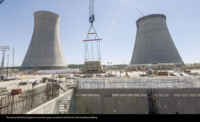The Maryland Public Service Commission is moving ahead with a request for proposals for 1,500 MW of new gas-fired generation, despite concerns raised by its regional grid operator about power pricing impacts. However, the state questions the grid manager's capacity predictions.
Maryland officials did not release the value of the planned construction, but the new plants could cost between $1 billion and $1.5 billion, says Glen Thomas, president of PJM Power Providers, the Valley Forge, Pa.-based regional grid operator. He says the additional power is not needed and is not economic.
Maryland's Public Service Commission (PSC) notified short-listed bidders of their selection late last month and now will begin further evaluation of proposals, says an official with the agency who asked not to be identified. Names of the bidders were not released. Plans for the new facilities, which were offered in proposals submitted on Jan. 20, would be available between June 1, 2013, and June 1, 2017.
In September, the PSC required the state's four investor-owned utilities—Baltimore Gas & Electric, Delmarva Power, Pepco and Potomac Edison—to issue the RFPs. About 90% of the state's generation comes from coal-fired and nuclear plants, and many coal-fired plants are facing closure, PSC officials testified. The solicitation was revised in December.
At a PSC hearing in January, agency Chairman Douglas Nazarian raised concerns about the grid operator's capacity estimates in Maryland. He noted the potential acceleration of retirements of the older coal-fired plants in the wake of new U.S. Environmental Protection Agency rules that would require them to install new pollution-control upgrades.
The Maryland Energy Administration said there is a difference between long-term stability and short-term reliability. If more than one possible change occurs—such as more plant retirements, drops in natural-gas prices, a delay in transmission projects or changes in demand response rules—Maryland might need new generation in 2015 rather than in 2020. "The best guess is 2020, but it's the risk that leads us to worry about 2015," Nazarian said. "PJM is good at what they do, but there are risks of them being wrong."
Maryland is the second state in the regional compact that has taken action to commission new capacity independent of the grid. The New Jersey Legislature last year required state regulators to subsidize the construction of 2,000 MW of new generation.
Thomas said if the PSC continues with the RFP, it faces litigation risk. "Similar efforts in New Jersey were challenged on constitutional grounds," Thomas said. "It's fair to say litigation could jeopardize this RFP. [It] is a state action and discriminates against out-of-state resources."
Environmentalists at the January hearing also opposed the new construction. "New generation is not needed," said a Sierra Club representative. "There are adequate resources in plants for seven or more years." However, Nazarian questioned why the group "is saying we should rely on PJM's market constructs that would continue capacity payments to old coal plants to stay around."
For more than two years, Maryland regulators have been considering whether the construction of new generation in the state should be mandated, citing the inability of PJM's reliability pricing model to attract new generation. The requirement for new gas-fired capacity also would allow Maryland to benefit from low-cost gas from shale, PSC says.



Post a comment to this article
Report Abusive Comment